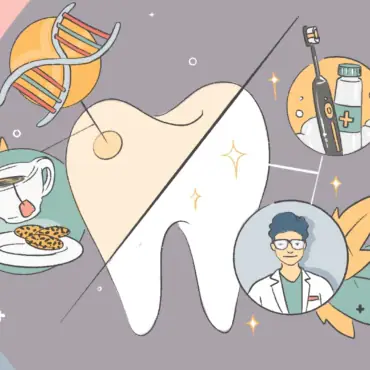Do you ever put off going to the dentist because you don’t think maintaining your oral health is that important? You may be surprised at the close connection between oral health and overall health and wellness.
It is common knowledge that visiting the dentist regularly and keeping your oral health in check is necessary to avoid toothaches, cavities, bad breath, and other dental issues. However, failing to take care of your teeth can also affect your overall physical health, opening the door to heart disease and more complications.
It’s important to understand the relationship between oral health and overall wellness, in the ways that they are connected and impact one another. Read on for information about physical conditions that are linked to oral health and how to avoid negative outcomes.
How does oral health affect overall health?
Dental health and well-being can impact a person’s overall health and wellness when bacteria from your mouth make their way into your bloodstream.
Usually, natural defenses, put in place by your body, can prevent bacteria from entering certain systems. However, if you do not practice proper oral hygiene, the bacteria that builds up in the mouth may enter your bloodstream and flow into your body.
Due for a checkup?
Find a top rated dentist near you that takes your insurance.
Bacteria inside your mouth can also cause tooth decay and gum disease. Research suggests that gum disease is linked to bacterial pneumonia and cardiovascular disease. Hence, paying attention to your oral health can prevent bacteria from entering your body and potentially protect you from worrying health conditions.
Seeking dental care has implications for your overall health as well as your oral health.
What conditions can be linked to oral health?
Some conditions related to poor dental health and wellness include:
- Cardiovascular Disease: Oral bacteria can cause inflammation. This can increase the chance of heart disease, strokes, and clogged arteries.
- Endocarditis: When you don’t pay attention to oral hygiene, bacteria from your mouth can flow into your bloodstream and attach themselves to parts of your heart. This creates an infection in the inner valves of your heart.
- Birth complications: Periodontitis can cause pregnancy complications, including giving birth to a premature baby. In addition, periodontal disease, if treated, reduces the need for insulin.
- Cancer: Improper oral hygiene may even be connected to leukemia or oral cancer.
- Pneumonia: Just like bacteria can enter your heart, it can also reach your lungs, causing pneumonia and related respiratory diseases.
What conditions might affect your oral health?
Just like oral health can cause health conditions, certain health conditions can affect your oral health. Some medical conditions that can affect your dental health include:
- Diabetes: Diabetic people are more likely to contract gum disease. This is because people with diabetes are less resistant to infections. People with gum disease find it difficult to control their blood sugar levels, something they can fix with regular periodontal care.
- Alzheimer’s: Alzheimer’s disease can lead to bad oral health as the condition progresses. s.
- HIV/Aids: People with HIV or aids are likely to experience oral complications such as mucosal lesions.
- Osteoporosis: When your bones become brittle or weak, it may cause oral health problems such as tooth loss and jaw bone loss. The drugs taken by osteoporosis patients may even damage jawbones.
How can I protect my oral health?
To improve your oral health and enhance your overall health, you need to maintain proper oral care, keep track of symptoms of gum disease, and visit a dentist near you regularly.
- Brush your teeth twice a day: Brushing your teeth with fluoride toothpaste is the most basic way of protecting your oral health. Maintaining this practice will allow your body’s defenses to function properly, preventing bacteria from entering your body.
- Maintain a healthy diet: The type of food you eat can affect your dental health. You should adopt a healthy, balanced diet. You should also avoid eating food with too much sugar in it.
- Floss every day: Flossing offers major dental benefits. Cleaning between your teeth can help remove bacteria-filled plaque and reduce inflammation.
- Book regular dentist appointments and check-ups: When you visit your dentist regularly, they can keep track of your oral health and prevent gum disease or tooth decay before it does any serious harm. You should schedule dentist appointments at least twice a year.
- Don’t use tobacco products: Tobacco can severely damage your lungs and gums. Avoid cigarettes and tobacco to maintain good oral and general health.
- Replace your toothbrush every few months: To protect your dental health and hygiene, you should replace your toothbrush every 3-4 months.
Apart from maintaining good oral hygiene, you should also keep a lookout for symptoms of gum disease. If you notice any signs, find a dentist and take the required measures immediately.
Some signs of gum disease are:
- Bad breath
- Unpleasant taste
- Mouth infections
- Inflammation or swelling of gums
- Loose teeth
To avoid health problems, you should maintain proper oral hygiene daily and be careful of symptoms of gum disease.
Final thoughts
Oral health can affect overall health since bacteria from the mouth can enter the bloodstream and other systems in the body. A lack of proper oral hygiene can result in an increased risk of diseases such as cardiovascular disease, endocarditis, and birth complications.
Due for a checkup?
Find a top rated dentist near you that takes your insurance.
To avoid chronic conditions due to a lack of oral hygiene, you should floss and brush your teeth daily, maintain a healthy diet, and stay on the lookout for symptoms of gum disease.
Visit Opencare.com to avoid such health problems due to poor oral hygiene and reduce your chances of tooth decay or gum disease!








